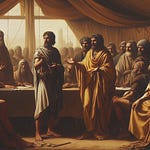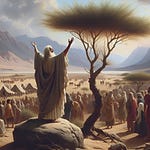Have you ever felt that your spirituality was only heightened when enduring hard dispensations of God’s providence?
In Exodus 8, Pharaoh functions as a warning to those who only cry out for deliverance when things are not going according to plan.
Commentary
As we explore the chapters recording the plagues, some attempt to explain them as the result of natural causes. For example, flagellates may have turned the river red, killing fish and driving frogs out, which, in turn, attracted lice and flies that spread disease. However, there is no support for this in the biblical record, and several details contradict it—such as the timing of the frogs’ departure, which aligned with Pharaoh’s request, and the testimony of the magicians, who would have preferred a natural explanation. Additionally, while some try to link each plague with an Egyptian god, there is no consensus or consistent correlation. It is best not to be dogmatic about unclear details. The plagues brought chaos to Egyptian life—a devastation expected for rebelling against God and harming His people.
vv. 1–15: The second plague, the plague of frogs, is introduced. The Nile brings misery to the Egyptians as frogs invade their living spaces, possibly making it impossible to walk without stepping on one. While frogs were not uncommon, the miracle lies in their intensity, timing, and locality. According to verse 7, the Egyptian magicians appear to replicate the miracle but cannot reverse the judgment—which would have been expected if they could truly perform miracles. Pharaoh then asks Moses to remove the plague, promising to let the Israelites go to worship. This marks Pharaoh’s first acknowledgment of God. Moses’ response to Pharaoh, “Glory over me,” is somewhat difficult to translate and interpret, but it appears to defer honor to Pharaoh, essentially saying, “The honor is yours to set the time.” The request is set for the next day, and Moses underscores that its fulfillment is intended to help Pharaoh understand “there is none like unto the Lord our God.” As promised, the next day all the frogs on land die, requiring a significant effort to clear the living spaces of the dead frogs. Despite this, Pharaoh hardens his heart.
vv. 16–19: The third plague, the plague of lice, is briefly described without any recorded warning to Pharaoh. Dust turns into tiny biting creatures, such as lice, gnats, mosquitoes, or midges. Whereas the frogs invaded their homes, these creatures invade their bodies. With the sky darkened by swarms of these little creatures, the Egyptian magicians fail to replicate this plague and admit to Pharaoh, “This is the finger of God.” Paul later draws application from these magicians and others like them, saying, “They shall proceed no further: for their folly shall be manifest unto all men” (2 Tim. 3:9).
vv. 20–32: Although Pharaoh was not warned about the lice, God instructs Moses to meet the Egyptian king by the river again. Likely still enduring the torment of the lice, Pharaoh is warned to release the Hebrews or face thick swarms of flies that will overwhelm the Egyptians. God further declares that Pharaoh will know it is His hand by the complete absence of judgment upon the children of Israel in Goshen. Pharaoh remains unmoved, and the flies are sent. Psalm 78:45 recounts, “He sent divers sorts of flies among them, which devoured them.” Under the misery of these judgments, Pharaoh relents slightly, suggesting that the Hebrews sacrifice within Egypt. Moses rejects these terms, and Pharaoh then agrees they may go but insists, “Only ye shall not go very far away,” limiting their journey to no more than three days. However, once the plague is removed, Pharaoh again hardens his heart and goes back on his word.
Application
Many voices will approve of sin. Pharaoh had no trouble finding people to ease his conscience. Remember, the conscience is not infallible; only the Word of God is. Liberal churches and compromised professing Christians act as Satan’s emissaries, much like the Egyptian magicians. Be cautious when seeking advice that you do not go to those who will simply tell you what you want to hear. What would the most devout believer say? Seek out those who know the Word, are governed by biblical charity, and live as if on the brink of eternity. Look for people who are most likely to ward you from sin, not lead you into it.
Recognizing divinity is not the same as acknowledging the true God. The magicians describe the plague of lice using anthropomorphic terms, attributing human characteristics to divine activity. God is a spirit and has no physical finger. While Scripture often uses such language, it seems the magicians may have avoided directly acknowledging Jehovah, the God of the Israelites, as the source of the plague. Do not be swayed when politicians or celebrities make vague references to God. Public remarks using generic titles for God can be deceptive, often made by those who refuse to acknowledge the exclusivity of Jesus Christ. Be discerning about imprecise references to God.
Sinners are made miserable by miniature judgments. God could have sent venomous spiders, scorpions, or large wild animals to torment the Egyptians. Instead, He demonstrates the futility of their powers through the smallest of creatures. In God’s hand, even the weakest organisms can bring great suffering. Let this remind us that one day men will desire to flee “from the face of him that sitteth on the throne, and from the wrath of the Lamb” (Rev. 6:16). Do not trifle with God. Do not ignore the possibility of severe judgment.
Worship offered to God must be on God’s terms. Pharaoh’s attempts to dictate how the Hebrews should worship show his failure to recognize that God’s people must separate from the wicked and the world. Paul challenges the Corinthians, “What agreement hath the temple of God with idols?… Wherefore come out from among them, and be ye separate, saith the Lord, and touch not the unclean thing; and I will receive you” (2 Cor. 6:16–17). To be received by God, we must separate from what pollutes us and ensure our worship is not influenced by pop culture. The use of Christian language does not make something biblical.
Christ’s presence with His people eliminates judgment. The fourth plague marks the first time Pharaoh is shown that the judgment does not affect the Hebrews. This distinction, likely true for all the plagues, highlights the difference Emmanuel makes. God with His people is what separates them from everyone else. The foundation of this distinction is God’s presence, and the fruit is the elimination of judgment: “There is therefore now no condemnation.” God demonstrates His favor to His people in the details of the Exodus. Let us not be like Pharaoh. Instead, let us learn from this account and ensure we have turned to Christ for salvation and deliverance from divine judgment.
“The slavery of Israel in Egypt was hopeless slavery, they could not get free unless God interfered and worked miracles in their behalf. And the slavery of the sinner to his sin is equally hopeless, he could never be free, unless a mind that is infinitely greater than he can ever command shall come to his assistance and help.” — Charles Spurgeon











